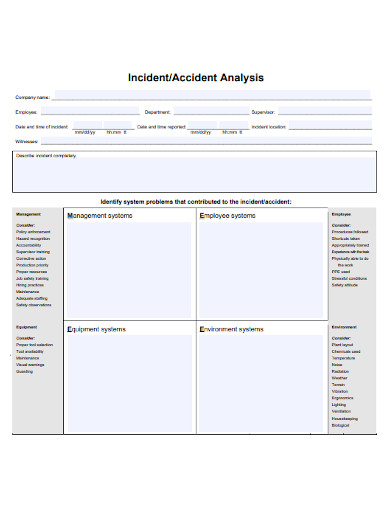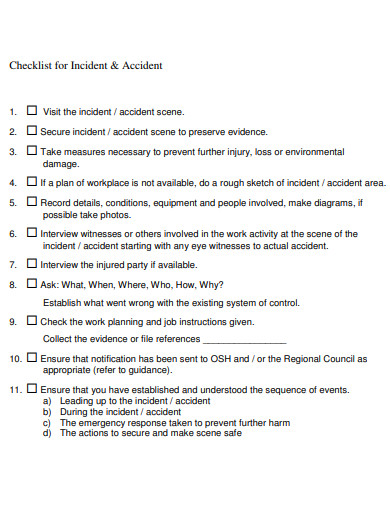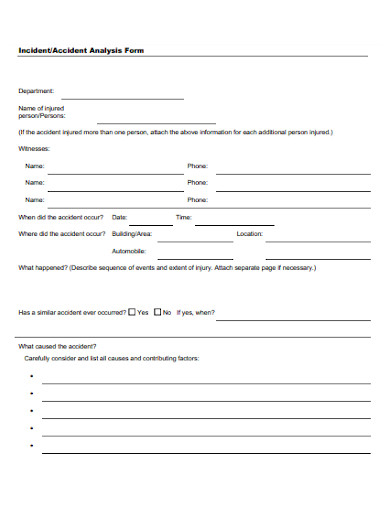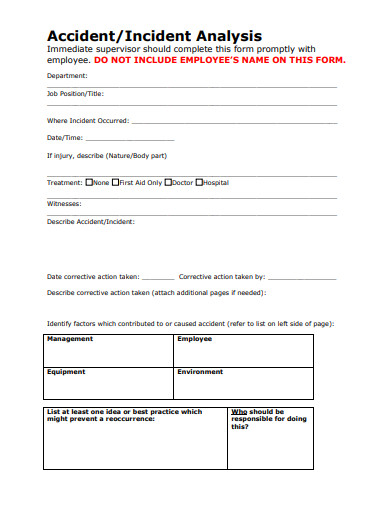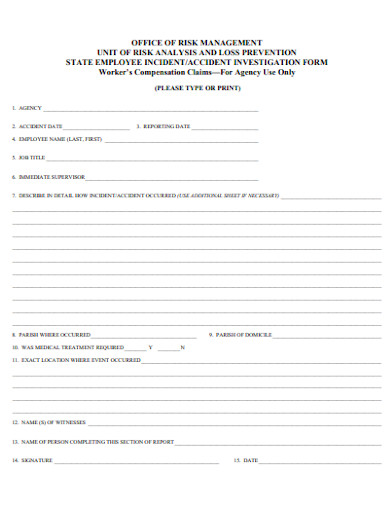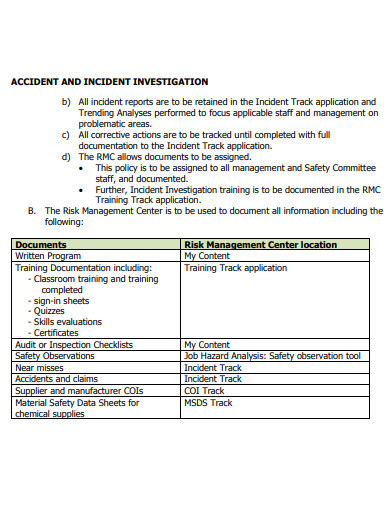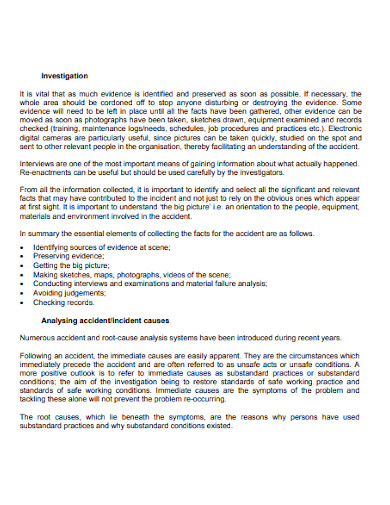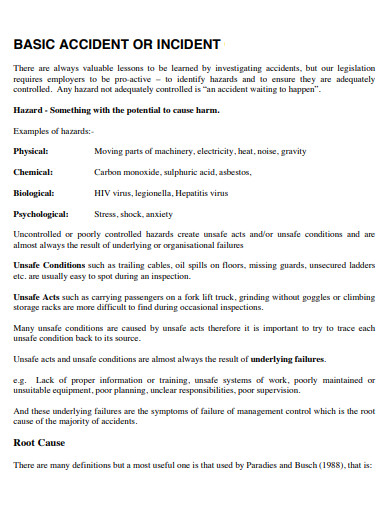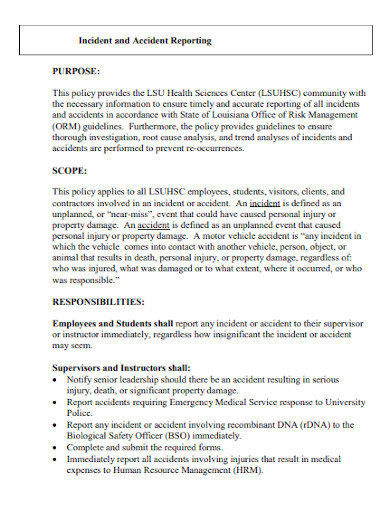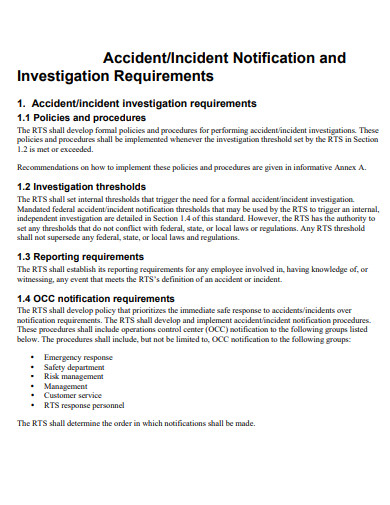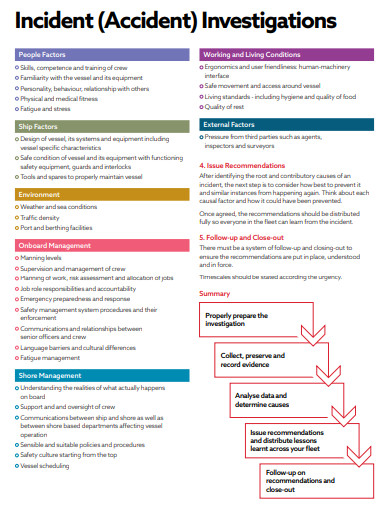10+ Incident/Accident Analysis Examples to Download
Have you ever questioned yourself when you get into accidents? It goes without saying, you cannot always avoid accidents from happening no matter where you may be or who you may be with. You cannot avoid any incident by being very or too careful. But what you can do is to find the reason by analyzing why these things happen. Being able to analyze an incident or an accident would give you a better understanding of how it happened, why it happened, and how you can avoid it from happening again in the near future. You may avoid it but it does not mean that you can avoid it for a long period of time. It would only mean that you are able to expect what will happen and give it a different outcome. By being able to do that, you can also be a step ahead. To do this, you must know how to analyze an accident or an incident. With this, you would need to learn about incident/accident analysis.
10+ Incident/Accident Analysis Examples
1. Incident/Accident Analysis
2. Incident/Accident Analysis Checklist
3. Incident/Accident Analysis Form
4. Employee Incident/Accident Analysis
5. Incident/Accident Risk Analysis
6. Incident/Accident Investigation Analysis
7. Incident/Accident Causes Analysis
8. Basic Incident/Accident Analysis
9. Incident/Accident Reporting Analysis
10. Editable Incident and Accident Analysis
11. Printable Incident/Accident Analysis
What Is an Incident/Accident Analysis?
An incident/accident analysis is a type of tool that is used in order to know, to understand the data given, and to determine the reason or the cause of the accident or the incident. The analysis would show the results in single or multiple outcomes in the report. The reason for analyzing the incident or the accidents that happened is to make sure that they are able to prevent or avoid anything like this from happening again. At least of course to make sure that if it does happen again, the case would be different and less dangerous. The purpose of an incident/accident analysis is to study the cause of the incident or accident and figure out a way to stop, prevent, or avoid at any cost from it happening again, to analyze through carefully thoughtout steps the reason for it happening.
How to Write an Incident/Accident Analysis
In many cases of understanding or analyzing an incident/accident report, there are some key things you need to do in order to know the factors that happened during the incident or the accident. This is also important to know how to analyze in order to file for your report, as well as for an investigation. With that being said, take a look at some of the following steps to get you started on writing an incident/accident analysis.
1. Write a Draft about Your Analysis Report
When you feel you are not sure about what you are going to be writing about or you are not sure if what you are writing is correct, make a draft. Drafting your analysis report would help you understand the flow of your report and to make it easier for you to finalize it later.
2. Add Important Information for Your Analysis
Details are important. When you are writing an analysis report, you must always take into account the details that are necessary for the report to be complete. With this in mind, when you are making your incident/accident analysis report, make sure you know the details about this incident or accident you are planning on analyzing.
3. Identify the Casualties If There Are Any
Identify the casualties if there are any in your analysis and in your report. The casualties help with identifying what happened behind the incident or the accident and giving you a wide berth to analyze the reason for the incident.
4. Check for Obvious or Common Patterns between Incidents
What you should also be doing in your analysis report is to check for common patterns that could happen between incidents. There is always a pattern for every multiple and continuous set of incidents or accidents that happened. Taking from this information, analyze if there are any reasons or findings you can take from it.
5. Find a Solution to Each Accident or Incident Recorded
Find solutions for each accident or incident recorded after you found out the reason in the analysis report. The solutions would be based on the analysis that you made from the patterns, the information, and the evidence you have taken from the scene or from interviews with witnesses.
FAQs
What is an incident/accident analysis?
A tool used in order to analyze, understand and get enough knowledge of the reason why an incident or an accident is happening.
How does analyzing help with solving the accident or incident problem?
Analyzing helps you by understanding or diving deeper as to what happened, how it happened, and why it happened. It also helps by giving you clues in order to help you find a solution for it.
How do you write an incident/accident analysis?
To write an incident/accident analysis, you must gather data that is important for the analysis to work. You must study the findings you have and from that, you are able to know what caused the accident, and how to stop it from repeating or at least avoid it from happening again.
Accidents happen and for some, they may say for a reason. Others however may think differently. Being able to understand what happened and how it happened through analyzing the details you have will surely help in the long run.



